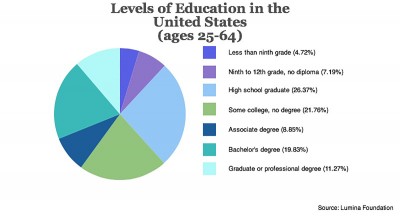
Although more students are earning college degrees, there is still a nationwide achievement gap that leaves the United States’ workforce demands unmet, a Thursday report by the Lumina Foundation found.
The percentage of jobs requiring a college degree will rise from 40 percent to 65 percent by 2020, the report stated. To address this demand, the report suggests encouraging people to finish their degrees and recognizing diverse forms of learning and credentials.
“For America to truly prosper, for the nation to attain not just individual opportunity and economic security, but social justice and cohesion, an increased sense of urgency is needed to expand college success dramatically, and in all directions,” said Jamie Merisotis, president and CEO of the Lumina Foundation, in a Thursday press release.
Approximately 51.5 percent of the 3.6 million working-age residents in Massachusetts had college degrees in 2014, which is a 1 percent increase from 2013, the report stated. In the Boston metropolitan region, approximately 54.7 percent of adults had two- or four-year college degrees in 2013, which is above the national average of 40 percent, according to the report.
Boston University spokesman Colin Riley said the achievement gap is an issue BU is continually aware of.
“[BU continues] to identify and direct resources to tutoring and advising, along with faculty maintaining good communication with students and identifying their needs and directing to their resources,” he said.
Hardin Coleman, the dean of the School of Education, said the school is doing its part to help close the achievement gap at BU.
“The BU School of Education’s goal is to recruit highly talented students to come be trained as highly effective teachers,” he said. “In addition, we’re deeply involved in producing research and scholarship in improving learning. We have very tight partnerships with several local schools where we’re co-comparing and providing more resources.”
Coleman said SED is highly engaged in the process of producing quality education.
“Schools of education have three responsibilities: to prepare highly effective educators, to produce research that’s useful to the field and to provide technical assistance to our partners in the field,” he said.
Philip Tate, a professor of educational history in SED, said there is more to the achievement gap than just education.
“The real question is how can we improve the opportunity for people to have healthy and accomplished lives,” he said. “Schooling would be an important part of that, but not the only part. The [U.S. President Barack] Obama healthcare initiative has helped a lot, but until we can guarantee that children have good healthcare [and] good nutrition, there’s not much more we can do with education.”
Several students said there are several steps universities could take to assist in closing achievement gaps.
Kira Eng, a freshman in SED, said the university could play a role in helping more Massachusetts residents earn college degrees.
“BU could reach out more to people who didn’t have as many privileges [and] maybe reach out to the high schools in the area,” she said.
Amber Walsh, a sophomore in SED and a volunteer student teacher, said the language barrier for non-native speakers is a significant part of the gap.
“Something that I’d really like to see is more bilingual schools because it’s beneficial for both parties, both native English speakers and native Spanish speakers, to be able to go to a school where they actually learn both,” she said. “Even if you’re not going to teach English as a Second Language as a second entity, just giving teachers more training to make sure the English language learners … are not falling through the cracks.”















































































































